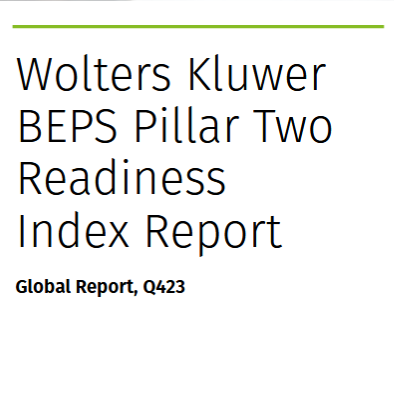
Wolters Kluwer BEPS Pillar Two Readiness Index – Many organisations appear unprepared for BEPS Pillar Two
Currently, 138 nations have joined the OECD’s inclusive framework on BEPS Pillar Two, marking a global push for implementation. The initiative establishes a 15% global minimum Effective Tax Rate for multinational enterprises with over €750 million in consolidated global revenue, effective from 2024. MNEs need to proactively prepare for the administrative, compliance, and tax challenges arising from these regulations, involving navigating numerous data points to determine Pillar Two top-up tax and GloBE tax liability.
As reporting deadlines loom on the horizon, data indicates that multinationals appear unprepared for the complexities around data handling and reporting required to meet BEPS Pillar Two obligations.
With a commitment to staying at the forefront of global tax compliance, Wolters Kluwer conducted its inaugural quarterly survey targeting enterprise organisations worldwide. This comprehensive survey gauges the progress and challenges faced by organisations in adhering to the OECD Pillar Two compliance reporting framework. The survey covered 15 key questions, providing a holistic view of the participants’ BEPS Pillar Two journey.
This report breaks down key insights, challenges, preparedness, and market sentiment surrounding about BEPS Pillar Two, providing valuable information to help multinational organisations navigate the evolving tax landscape.
Download the report to stay across key trends in the dynamic world of global taxation.
Key findings:
- Encouragingly, 73.44% of organisations have initiated their BEPS Pillar Two journey, though 53.94% remain in the early stages of monitoring and assessment.
- The primary challenges identified include understanding data requirements (37.63%) and limited resources(26.88%).
- Group challenges were notably strong, with issues such as varying jurisdictions’ timing for enacting legislation and engaging non-tax stakeholders being prominent.
Challenges:
- 77.42% foresee difficulties in obtaining necessary data for BEPS Pillar Two reporting.
- Only 15% express confidence in their current tax technology and data management systems.
- Respondents are divided on the achievability of international collaboration and consistency (45.16% yes, 54.84% no), citing challenges in adapting to changing legislation and local requirements (85.42%).
Opportunities:
- Despite challenges, organisations recognise positive opportunities, as indicated in responses to the question (Q12).
- Majority of respondents are open to considering tax technology solutions (Q13).
- Compliance burden (77.11%) outweighs the prospect of additional tax exposure, with 40.96% foreseeing BEPS Pillar Two reshaping their organisation’s approach to tax and compliance risk assessment.
About the Wolters Kluwer BEPS Pillar Two Readiness Index:
The BEPS Pillar Two Readiness Index is a quarterly initiative aimed at gauging the worldwide readiness of BEPS Pillar Two measures. This survey seeks to provide valuable insights into the implementation of international tax policies and their impact on businesses across the globe. The insights gained from the Wolters Kluwer BEPS Pillar Two Readiness Index are aimed to better guide impacted organisations through the complexities of Pillar Two with valuable information that aids in their strategic planning and decision-making around BEPS Pillar Two. The report will also provide Wolters Kluwer’s internal experts with a deeper comprehension of the challenges faced and sentiment of multinational enterprises. This insight will enable us to further enhance and tailor our technology solution to effectively address these challenges.


